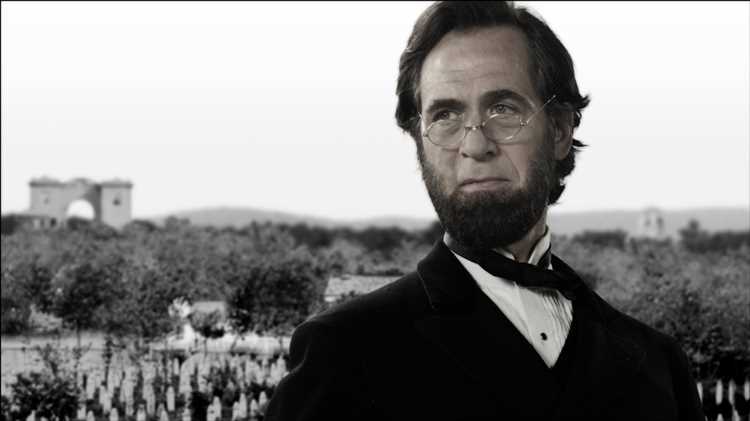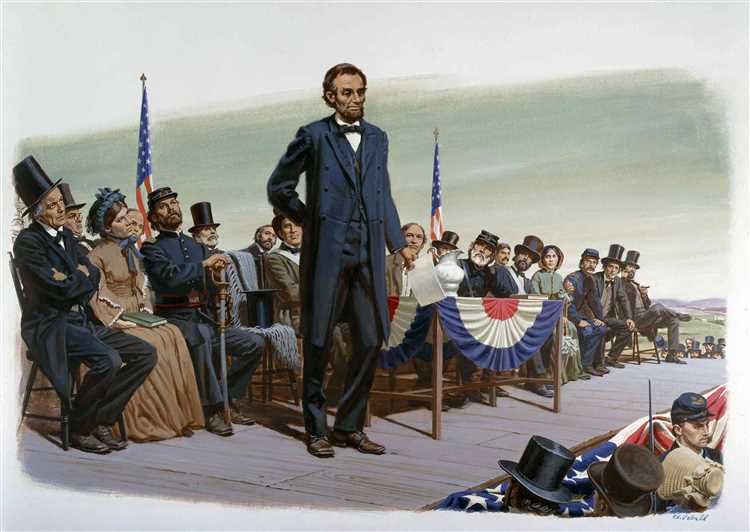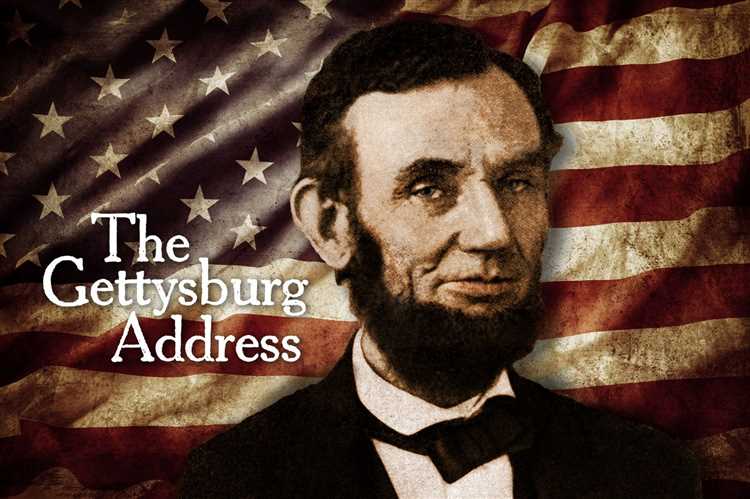
The Gettysburg Address is one of the most iconic speeches in American history, given by President Abraham Lincoln during the American Civil War. The speech was delivered on November 19, 1863, at the dedication of the Soldiers’ National Cemetery in Gettysburg, Pennsylvania. In just 272 words, Lincoln addressed the significance of the Civil War and the principles that the United States stood for.
At the time of the Gettysburg Address, the United States was deeply divided due to the Civil War. The speech came at a pivotal moment, when the nation was grappling with the question of whether the Union would survive or if the Confederate states would succeed in seceding. Lincoln’s speech aimed to unite the nation and reaffirm the principles of equality and freedom upon which it was founded.
One of the remarkable aspects of the Gettysburg Address is its brevity and simplicity. Lincoln’s eloquent words not only paid tribute to the soldiers who had given their lives in the battle, but also served as a call to action for the living. He emphasized the need to preserve the Union and ensure that “government of the people, by the people, for the people, shall not perish from the earth.” These powerful words inspired countless Americans and continue to resonate today.
The impact of Lincoln’s Gettysburg Address cannot be overstated. It not only rallied support for the Union cause during the Civil War, but also redefined the purpose and meaning of the United States. The speech highlighted the importance of equality, democracy, and the preservation of the Union. Lincoln’s words continue to be studied and celebrated as a seminal moment in American history, reminding us of the power of a well-crafted speech to change the course of history.
The Importance of the Gettysburg Address

The Gettysburg Address, delivered by President Abraham Lincoln on November 19, 1863, is widely regarded as one of the most important speeches in American history. Its significance lies not only in its brevity, lasting just over two minutes, but also in its profound impact on the nation and its role in shaping the course of the Civil War.
At the time of the Gettysburg Address, the United States was deeply divided by the Civil War, a conflict that threatened to tear the nation apart. In this context, Lincoln’s speech served as a rallying cry for unity and a reminder of the ideals upon which the country was founded.
The Gettysburg Address emphasized the importance of preserving the Union and the principles of equality and freedom that it represented. Lincoln spoke of the sacrifices made by the soldiers who fought and died on the battlefield, highlighting the need to honor their memory by continuing the fight for a united and just nation.
Furthermore, the Gettysburg Address played a crucial role in shaping public opinion and rallying support for the Union cause. Its powerful and eloquent language resonated with the American people, inspiring them to persevere in the face of adversity and to strive towards a future where all citizens would be treated as equals.
The impact of the Gettysburg Address extended far beyond its immediate audience. It became a symbol of American values and a testament to the enduring power of words. Its message of unity and equality continues to resonate today, serving as a reminder of the importance of upholding these ideals in the face of adversity.
In conclusion, the Gettysburg Address holds immense historical and cultural significance. It served as a call to action during a critical period in American history and continues to inspire generations with its timeless message of unity, equality, and the pursuit of a more perfect union.
The Battle of Gettysburg
The Battle of Gettysburg was a major turning point in the American Civil War. It took place from July 1 to July 3, 1863, in Gettysburg, Pennsylvania. The battle was fought between the Confederate Army of Northern Virginia, commanded by General Robert E. Lee, and the Union Army of the Potomac, commanded by General George G. Meade.
The battle began when Confederate forces attacked the Union army, which was positioned on high ground. The fighting was intense and resulted in heavy casualties on both sides. The Union army, although initially outnumbered, was able to hold its position and repel the Confederate attacks.
The turning point of the battle came on the third day, when General Lee ordered a massive assault known as Pickett’s Charge. The Confederate forces advanced across an open field towards the Union lines, but they were met with heavy artillery fire and infantry resistance. The assault ultimately failed, and the Confederate army was forced to retreat.
The Battle of Gettysburg was a decisive victory for the Union army and is often considered the turning point of the Civil War. The Confederate army suffered significant losses, and General Lee was forced to abandon his invasion of the North. The battle also had a profound impact on President Abraham Lincoln, who would later deliver his famous Gettysburg Address at the site of the battle.
Today, the Gettysburg National Military Park preserves the battlefield and serves as a memorial to those who fought and died there. Visitors can explore the battlefield, visit the museum and visitor center, and learn about the significance of the battle in American history.
Lincoln’s Address
The Gettysburg Address, delivered by President Abraham Lincoln on November 19, 1863, is one of the most famous speeches in American history. In just a few short minutes, Lincoln was able to convey the significance of the Civil War and the importance of preserving the Union.
In his address, Lincoln emphasized the principles of equality and democracy that the United States was founded upon. He spoke of a “new birth of freedom” and the need to ensure that the nation would continue to be guided by these ideals.
Lincoln’s words were powerful and resonated with the American people. He reminded them that the sacrifices made by those who fought and died in the battle of Gettysburg should not be in vain, but should inspire a renewed commitment to the cause of freedom and justice.
The Gettysburg Address was not initially well-received by everyone. Some criticized Lincoln for the brevity of his speech, while others felt that he did not adequately address the issues at hand. However, over time, the address came to be recognized as a masterpiece of rhetoric and a defining moment in American history.
Today, the Gettysburg Address is still studied and revered for its eloquence and its timeless message. It serves as a reminder of the power of words to inspire and unite a nation, and continues to be a source of inspiration for future generations.
The Impact on American History

The Gettysburg Address, delivered by Abraham Lincoln on November 19, 1863, had a profound impact on American history. This iconic speech not only addressed the Civil War, but also brought attention to the importance of equality and the preservation of democracy.
One of the key impacts of the Gettysburg Address was its role in shaping the national identity of the United States. Lincoln’s words emphasized the idea that America was not just a collection of individual states, but a unified nation with a shared history and purpose. This notion helped to solidify the concept of a strong central government and laid the foundation for the United States as we know it today.
The speech also played a crucial role in redefining the purpose of the Civil War. Lincoln framed the conflict as a battle for the preservation of democracy and equality, rather than simply a fight to reunite the divided states. This shift in perspective helped to rally public support for the Union cause and inspire soldiers to continue fighting for a greater cause.
Furthermore, the Gettysburg Address had a lasting impact on the fight for civil rights in America. Lincoln’s words highlighted the need for equality and justice for all citizens, regardless of race or background. This sentiment would later be echoed in the Civil Rights Movement of the 20th century, as activists fought to ensure that Lincoln’s vision of equality was fully realized.
In conclusion, the Gettysburg Address had a profound impact on American history. It helped shape the national identity, redefined the purpose of the Civil War, and inspired the fight for civil rights. Lincoln’s words continue to resonate today, reminding us of the importance of unity, equality, and the preservation of democracy.
The Significance of Lincoln’s Words
Abraham Lincoln’s Gettysburg Address is widely regarded as one of the most important and influential speeches in American history. Given during the height of the Civil War, Lincoln’s words resonated with the American people and continue to hold deep significance today.
One of the key reasons why Lincoln’s words are so significant is because they helped to redefine the purpose and meaning of the American Civil War. In his address, Lincoln emphasized the importance of preserving the Union and the principles of equality and freedom that America was founded upon. By doing so, he gave the war a higher purpose and inspired the American people to continue fighting for a united and free nation.
Furthermore, Lincoln’s Gettysburg Address is significant because it highlighted the sacrifice and bravery of the soldiers who fought in the Civil War. He acknowledged that the nation was “conceived in Liberty, and dedicated to the proposition that all men are created equal,” and that the soldiers who had died in battle had given their lives to uphold these ideals. This recognition of the soldiers’ sacrifice helped to unite the American people and foster a sense of national pride.
Another aspect of the significance of Lincoln’s words is their enduring impact on the American political and cultural landscape. The Gettysburg Address is often cited as a masterpiece of oratory and is studied in schools and universities across the country. Lincoln’s eloquence and ability to distill complex ideas into simple and powerful words have made the speech a timeless piece of American rhetoric.
Finally, Lincoln’s words in the Gettysburg Address serve as a reminder of the importance of leadership and the power of words in shaping history. In a time of great division and turmoil, Lincoln’s speech offered hope and inspiration to a nation in need. It demonstrated the power of a leader to bring people together and to articulate a vision for a better future.
In conclusion, the significance of Lincoln’s words in the Gettysburg Address cannot be overstated. They redefined the purpose of the Civil War, honored the sacrifice of the soldiers, influenced American culture and politics, and demonstrated the power of leadership and words. Lincoln’s address continues to inspire and resonate with people, serving as a timeless reminder of the values and ideals that America strives to uphold.
The Power of Rhetoric
The power of rhetoric is undeniably influential in shaping history and inspiring change. Throughout time, great leaders have harnessed the art of persuasive communication to rally the masses and convey their messages effectively. One such example is Abraham Lincoln and his iconic Gettysburg Address.
In his speech, Lincoln masterfully utilized rhetorical devices to convey his message and evoke emotions from his audience. The carefully crafted words and powerful imagery he employed left a lasting impact on the nation. The Gettysburg Address, delivered during the American Civil War, not only honored the fallen soldiers but also served as a call to action for the American people.
Lincoln’s use of repetition, such as the famous phrase “government of the people, by the people, for the people,” emphasized the democratic ideals that the United States was built upon. This repetition reinforced the concept of unity and reminded the audience of their shared purpose and responsibilities as citizens.
The Gettysburg Address is also notable for its concise and impactful language. In just a few short paragraphs, Lincoln was able to convey the immense sacrifice of the soldiers and express his hope for a brighter future. His use of vivid imagery, such as “a new birth of freedom,” painted a picture of a nation reborn from the ashes of war.
Furthermore, Lincoln’s mastery of ethos, pathos, and logos further enhanced the persuasiveness of his speech. By establishing his credibility as the President of the United States, appealing to the emotions of his audience, and presenting logical arguments, Lincoln was able to effectively win over the hearts and minds of the American people.
The power of rhetoric, as demonstrated by Lincoln in the Gettysburg Address, cannot be underestimated. It has the ability to unite, inspire, and motivate people to take action. Even to this day, the words spoken by Lincoln continue to resonate and remind us of the enduring power of persuasive communication.